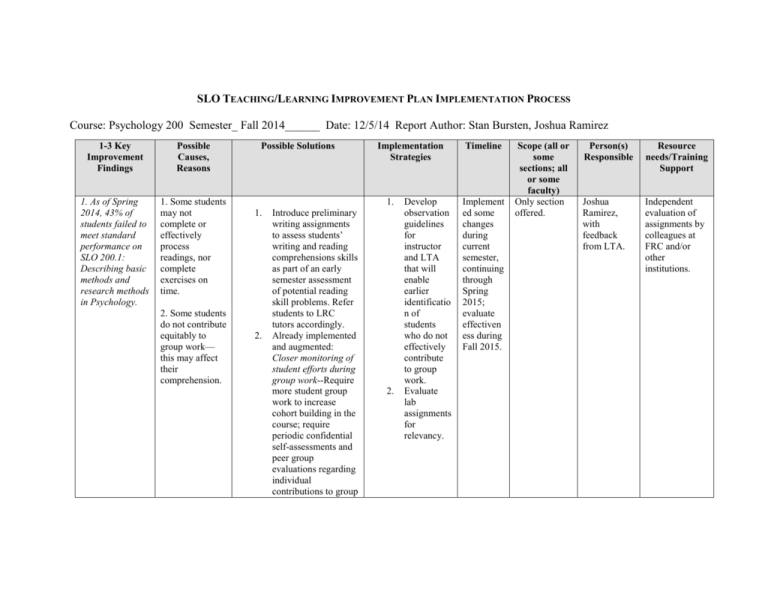doc - Student Learning Outcomes
advertisement

SLO TEACHING/LEARNING IMPROVEMENT PLAN IMPLEMENTATION PROCESS Course: Psychology 200 Semester_ Fall 2014______ Date: 12/5/14 Report Author: Stan Bursten, Joshua Ramirez 1-3 Key Improvement Findings Possible Causes, Reasons 1. As of Spring 2014, 43% of students failed to meet standard performance on SLO 200.1: Describing basic methods and research methods in Psychology. 1. Some students may not complete or effectively process readings, nor complete exercises on time. 2. Some students do not contribute equitably to group work— this may affect their comprehension. Possible Solutions Implementation Strategies 1. 1. 2. Introduce preliminary writing assignments to assess students’ writing and reading comprehensions skills as part of an early semester assessment of potential reading skill problems. Refer students to LRC tutors accordingly. Already implemented and augmented: Closer monitoring of student efforts during group work--Require more student group work to increase cohort building in the course; require periodic confidential self-assessments and peer group evaluations regarding individual contributions to group 2. Develop observation guidelines for instructor and LTA that will enable earlier identificatio n of students who do not effectively contribute to group work. Evaluate lab assignments for relevancy. Timeline Implement ed some changes during current semester, continuing through Spring 2015; evaluate effectiven ess during Fall 2015. Scope (all or some sections; all or some faculty) Only section offered. Person(s) Responsible Resource needs/Training Support Joshua Ramirez, with feedback from LTA. Independent evaluation of assignments by colleagues at FRC and/or other institutions. 3. 4. 2.85% of students performed at exemplary levels SLO 200.3: Evaluating ethical standards and the appropriateness of conclusions from psychological research. The assignments and exam questions used to assess this SLO are too lenient; We seek to increase the rigor of assessments to ensure a regression towards the mean in student scores. 1. 2. 3. 4. work; reassign group work as individual assignments when individual students do not contribute satisfactorily (as determined by instructor, LTA, and student peer evaluations) Require students to maintain a lab journal or an on-line blog equivalent so that students can “invoice” their weekly contributions to exercises and reflect accordingly. Already implemented: Reduce number of required assignments. Rethink items used to assess SLO 2. Develop 1-2 assignments which more directly relate to SLO 1. Include 1 additional lecture focusing on ethics and research. Require students to participate in the National Institutes of Health Human Subjects Protections 1. 2. Evaluate lectures and assignments which cover SLO 2 for relevance. Already implemente d and currently being modified: Develop exercises Implement ed some changes during current semester and continue through Spring 2015; evaluate effectiven Only section offered. Joshua Ramirez, with feedback from LTA. FRC advice on DLAs and rubrics. 3. From Fall 2011 to Spring 2014, there has been an inordinate reduction in the proportion of students failing to meet standard (80% down to 0% ) on performance on SLO 200.2: Designing, conducting, Standards for grading the research papers are too lenient. We seek to increase the rigor of assessments to ensure a regression towards the mean in student scores. Tutorial; assess accordingly via written assignments and exams. 5. Require student group members to serve as a “mock institutional review board” for their peers and to apply content learned through the NIH Human Subjects Protections Research Tutorial to evaluate the ethical considerations of their peers’ proposed research projects (e.g., protocols and informed consent documents). Evaluate accordingly. 1. Develop more rigorous rubric definitions. 2. Require students to conduct a thorough data base search and to develop a literature review for lab reports that integrate the information acquired from no less than 25 sources. 3. Require students to design studies for which at least 4 types of inferential statistical 1. 2. that address ethical issues in research. ess during Fall 2015 Communica tion between instructor and LTA regarding grading procedures. As part of a first lab meeting, request that library staff provide students Implement some changes during Spring 2015 and evaluate effectiven ess during Fall 2015 Joshua Ramirez, with feedback from LTA. None analyzing and communicating the results derived from psychological research. analyses are required of the acquired data. 3. 4. 5. with a tutorial on database searches and an introduction to interlibrary loan. Require students to take a climate survey to assess students’ proficiency with statistics; refer to Psy 150 Gateway tutor or LRC tutors accordingly .








